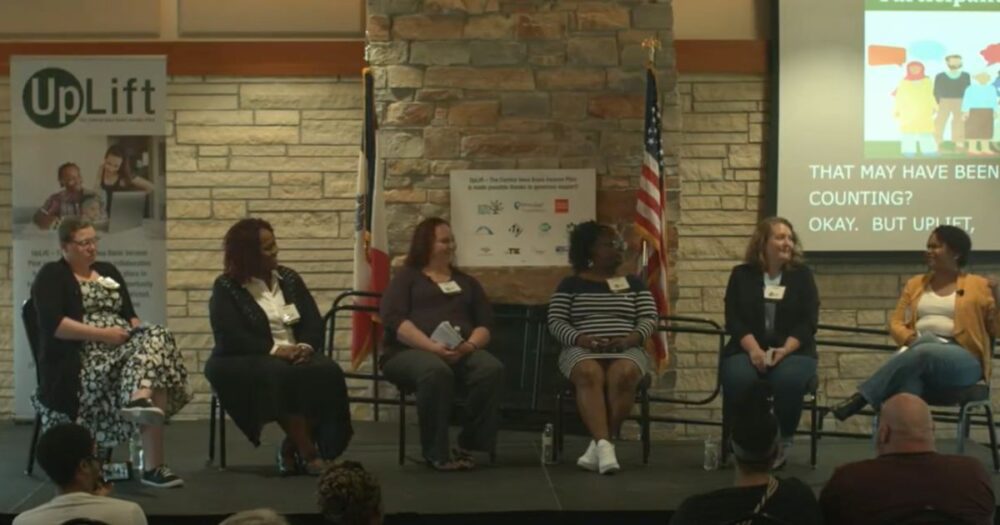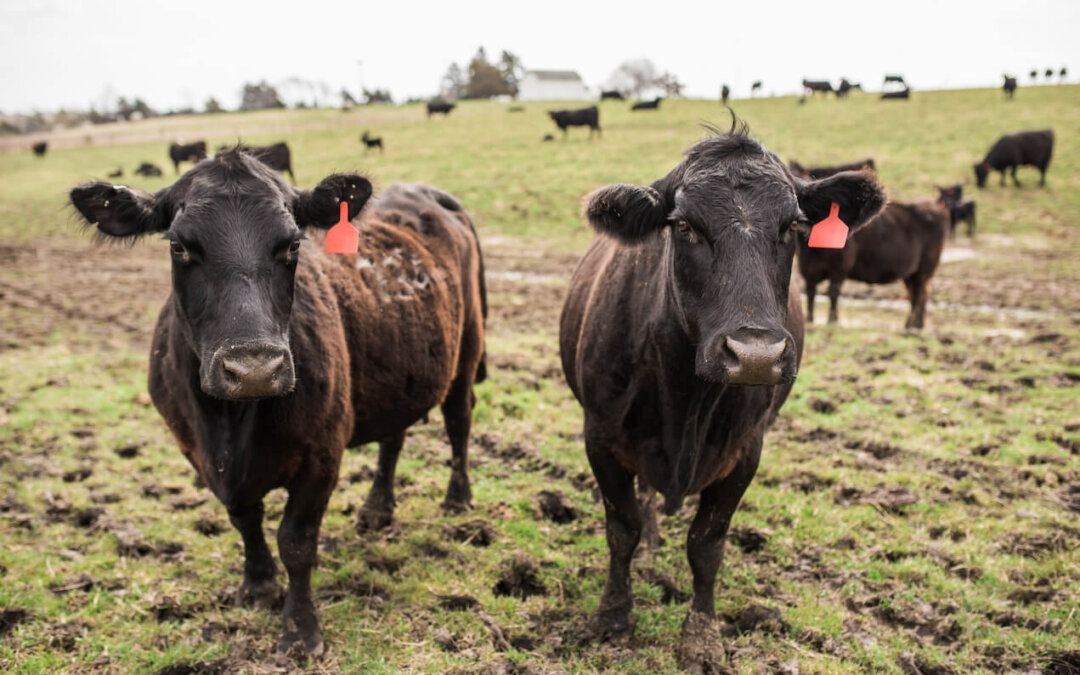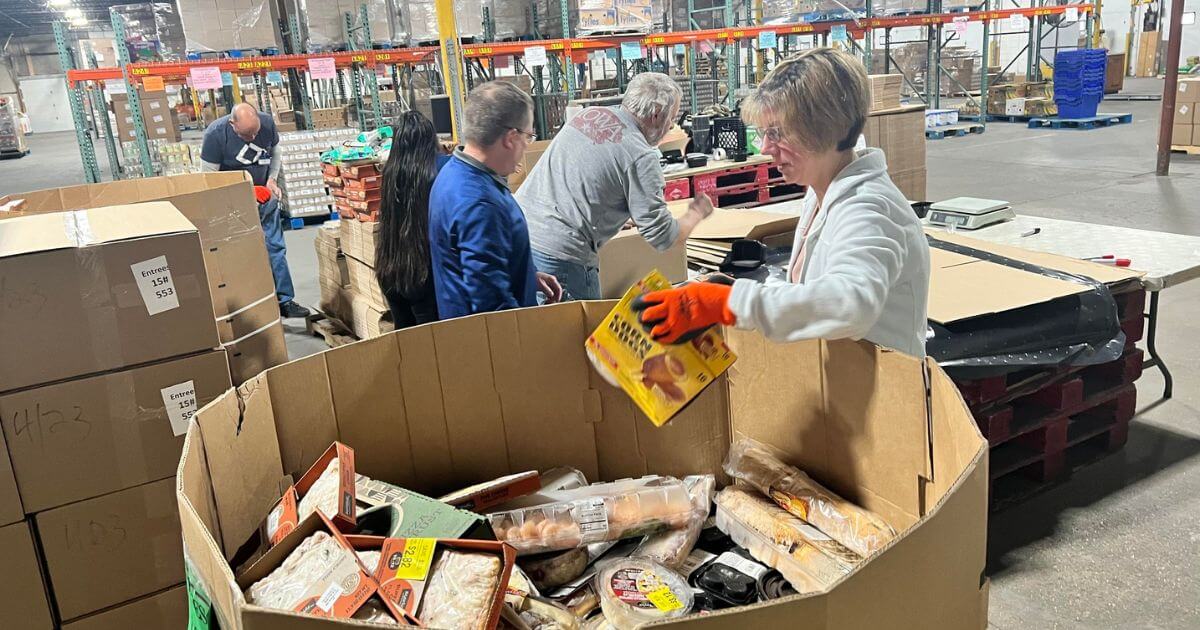
UpLift participants, from left, Skye, Nicole, Kelli, Sheila, and Tanya, with moderator Teresa Zilk, during a panel on how the $500 monthly basic income payments have helped for the past year. (Screenshot from UpLift video)
The UpLift program not only helped with bills, it helped start businesses, participants in the basic income pilot said—rebuking an Iowa law that banned such programs in the state.
People who received $500 per month with no strings attached told their stories Wednesday evening in a Windsor Heights event put on by UpLift, which has been running a basic income test in central Iowa for the past year.
UpLift—The Central Iowa Basic Income Pilot is the first basic income initiative in the state. Lots of community organizations are working in partnership on it, including The Harkin Institute at Drake University in Des Moines, and Des Moines University‘s public health team.
The five UpLift panelists said receiving the $500 payments has helped them but in different ways. UpLift only used their first names in Wednesday’s panel.
Sheila cares for her two granddaughters with her husband and is a customer service representative. She said getting the call from UpLift was like “winning the lottery,” and she “broke down crying.”
“I made a plan to just be the best I could be with that five hundred dollars,” Shelia said.
Sheila wanted to work for herself in real estate and put herself through classes. But she thought of giving it up because she didn’t have the money to continue. UpLift changed that, and even gave her the confidence to pivot industries to trucking.
“I have savings now. My credit is good. My son is doing amazing in college, and I’m able to take care of my two granddaughters,” she said. “This has definitely uplifted my life and my family’s lives.”
‘We don’t have to worry’
Tanya said her divorce 13 years ago was “very trying financially.” Her son is a junior at the University of Iowa and her daughter graduates high school this year.
“Not having any stipulations around it has made it very freeing,” Tanya said. “There’s no concern that, if I do something differently or change jobs or make more money, this is just going to get taken from me. … ‘Uplift’ really describes what it’s done, I think, for everyone that’s been a participant.”
Around 42% of the payments, so far, are going to food and groceries, UpLift officials said. Another 26% were classified as “retail,” though UpLift notes that includes places that also function as grocery stores, such as Walmart and Target.
Kelli said her first thought was to use that money to help move her family to a better neighborhood. Two months after the payments began, they did. Now, she said she doesn’t worry about letting her younger son play in the backyard, “which was a big thing” at her former house.
“I do have four boys that I raise on my own, and so life gets hard sometimes,” said Kelli, who noted UpLift payments have helped her save money for emergencies. “If something is to go wrong, then we’re good; we don’t have to worry about how we’re going to come up with the money to fix a vehicle.”
Skye, a single mom of two, worked as a delivery driver for Jimmy John’s.
“With those payments coming in, it helped me to pay bills that I was behind on, or just try to stay current with things,” she said. “It’s a real struggle when you’re a single parent and you don’t have familial support. … It’s a very defeating feeling, it’s a very frustrating feeling. And having this money that I can count on every single month helps ease some of that stress and anxiety and frustration that I have every single month.”
Nicole, who said she has been laid off twice during the last year, said she had less stress after her positions being eliminated “because I had this cushion.”
“I have savings because of this. We have the business going on because of this,” she said. “I can volunteer at my daughter’s school when she’s struggling. … Mama doesn’t have to say, ‘Baby, I’m working right now.’ It helps us, it helps our children.”
Background on UpLift
More than 6,000 eligible participants from Dallas, Polk, and Warren counties applied to the study, and 110 of them were randomly selected to receive $500 monthly payments over a two-year span. Another 140 people who were not receiving money are functioning as the study’s control group, to see what difference the payments make.
UpLift worked with 30 area nonprofits/community programs to ensure study participants accurately reflected the demographics of the three participating counties, and 10% of participants come from rural communities, 25% from micropolitan communities, and 65% from metropolitan communities.
It is funded by private companies such as Principal and Wells Fargo, federal American Rescue Plan money from the cities of Des Moines and Urbandale, and other contributions from Polk County and Windsor Heights.
The program began in May 2023 and will continue through May 2025. A study on the program’s results will be released in 2026.
Why is UpLift being attacked?
Iowa Republicans banned local governments from participating in basic income programs this year in a direct attack on UpLift, the sole basic income program in Iowa.
Sen. Brad Zaun, a Republican from Urbandale, called basic income programs such as UpLift a form of socialism: “We’re taking taxpayer money—property taxpayer money—and we’re redistributing wealth,” he said.
Sen. Mike Bousselot, a Republican from Ankeny, also argued that any government social benefits keep people from working hard to elevate their financial status.
“The entitlements that we have created have created a disincentive for Iowans to take that overtime, to take that next job,” he said. “That is not a poverty cliff, that is a poverty trap.”
Iowa Democrats, who all voted against the ban, said that was nonsense, and called the basic income ban an attack on working Iowans.
“We could actually be working on something that’s going to solve some problems … and you chose to attack an organization that’s going to help people,” said Sen. Bill Dotzler, a Democrat from Waterloo. “It’s not coming out of the Iowa Senate’s pocket; it’s not coming out of the general fund. What are we doing here?”
Sen. Tony Bisignano, a Democrat from Des Moines, tried reading a list of names of Iowa legislators who have also been taking “property taxpayer money” from farm subsidies before he was shut down.
“I’m just going to do some last names to show you what a stipend is—what socialism is,” he said.
Though Bisignano didn’t get to read his list, Starting Line’s Ty Rushing has those names—and how many millions they’ve gotten—right here.
Support Our Cause
Thank you for taking the time to read our work. Before you go, we hope you'll consider supporting our values-driven journalism, which has always strived to make clear what's really at stake for Iowans and our future.
Since day one, our goal here at Iowa Starting Line has always been to empower people across the state with fact-based news and information. We believe that when people are armed with knowledge about what's happening in their local, state, and federal governments—including who is working on their behalf and who is actively trying to block efforts aimed at improving the daily lives of Iowan families—they will be inspired to become civically engaged.


Don’t sleep on these Iowa union member discounts & perks
Being an Iowa union member boasts tons of benefits—from discounts at local businesses to savings on cell phone plans. Learn where and how you can...

‘Some people work their butts off and other people get rich’: Gwen Frisbie-Fulton’s view from rural America
Growing up, my dad only made two rules for me outside of my chores. The first one was that I wasn’t allowed to make soap with lye. Glycerine soap,...

6 employment resources for Iowans with disabilities
Learn more about organizations across Iowa doing their part to ensure people with intellectual and developmental disabilities (IDDs) find suitable...

Guest Post: We need a transparent livestock market to save family farms
Family farmers I know say we’ve been under the thumb of corporate ag bosses and the big meatpackers for too long. Political affiliation doesn’t seem...

Elder fraud on rise: Older Iowans lost more than $16.4 million in 2023
A new report shows the number of Americans getting scammed is on the rise, and elder fraud is the most common. Iowa ranked 33rd in the nation for...

Biden makes 4 million more workers eligible for overtime pay
The Biden administration announced a new rule Tuesday to expand overtime pay for around 4 million lower-paid salaried employees nationwide. The...





